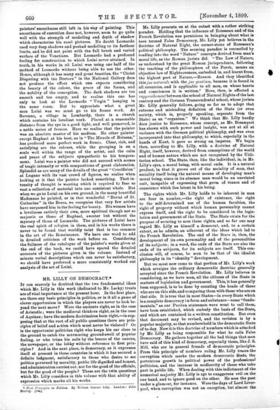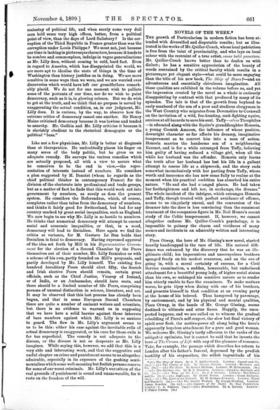MR. LILLY ON DEMOCRACY.*
IT can scarcely be doubted that the two fundamental ideas which Mr. Lilly in this work (dedicated to Mr. Lecky) treats are of vital importance at the present hour. In the first place, are there any basic principles in politics, or is it all a game of clever opportunism in which the players are never to look be- yond the next move ? Were the ancients right, as in the case of Aristotle ; were the medimval thinkers right, as in the case of Aquinas ; have the modern doctrinaires been right,—in sup- posing that at the root of all public questions there are prin- ciples of belief and action which must never be violated ? Or is the opportunist politician right who keeps his ear close to the ground to catch the murmuring ground-swell of popular feeling, or who trims his sails by the breeze of the caucus, the newspaper, or the lobby without reference to first prin- ciples ? And in the next place, is democracy, as it expresses itself at present in those countries in which it has secured a definite lodgment, satisfactory to those who desire to see politics governed by morality, public life dignified and honest, and administration carried out, not for the good of the officials, but for the good of the people ? These are the twin cinestioqS which Mr. Lilly considers in this volume with that ability of expression which marks all his works.
• First Principles in Potitica. ay William Samuel Lilly. London : John Murray. [148.1 Mr. Lilly presents us at the outset with a rather striking paradox. Holding that the influence of Rousseau and of the French Revolution was pernicious in bringing about what is here termed False Democracy, Mr. Lilly yet believes in the doctrine of Natural Right, the corner-stone of Rousseau's political philosophy. The seeming paradox is reconciled by reading into the word "Nature" concepts derived from man's moral life, as the Roman jurists did. " The Law of Nature, as understood by the great Roman jurisprudents, following the teaching of the philosophers of the Porch, means an objective law of Righteousness, embodied in, and learnt from, the highest part of Nature,—Reason. And they identified this jus net urale with the jus gentium, because it is found in all countries, and is applicable to all men, on whose hearts and consciences it is written." Here, then, is effected a rapprochement between the school of Natural Rights of the last century and the German Transcendental school, whose jurists Mr. Lilly generally follows, going so far as to adopt that extreme and misleading definition of the State (or even society, which is, properly speaking, separate from the State) as an "organism." We think that Mr. Lilly hardly does justice to Rousseau, whose concept, as Mr. Bosanquet has shown with such power and insight, was not at all at variance with the German political philosophy, and was even incorporated into that philosophy, to which, especially in the hands of Kant, it gave so strong an impetus. We begin then, according to Mr. Lilly, with a doctrine of Natural Right, itself, however, derived from conceptions of the world and of human nature which are not recognised by the Utili- tarian school. The State, then, like the individual, is, in Mr. Lilly's eyes, a moral being, with moral ends. It is a natural product, in that it grows out of the sociality of man, that sociality itself being the natural means of developing man's moral being, sinca in its absence man would be an unrelated unit, incapable of expressing that germ of reason and of conscience which lies latent in his being.
The rights which Mr. Lilly holds to be inherent in man are four in number,—the right of existence, the right to the self-determined use of the human faculties, the right of property without which human personality cannot express itself, and the right to be considered in the legis- lation and government of the State. The State exists for the purpose of securing to men these rights, and so far one may regard Mr. Lilly as himself a democrat, and, to a certain extent., as he admits, an adherent of the ideas which led to the French Revolution. The end of the State is, then, the development of its own personality and of the personalities of its subjects ; in a word, the ends of the State are also the ends of its subjects, for its subjects are itself. This con- clusion will, of course, be seen to be that of the idealist philosophy in its " identity " development.
But we must now come to that portion of Mr. Lilly's work which arraigns the ordinary democratic doctrine generally accepted since the French Revolution. Mr. Lilly believes in considering, as we have seen, all the citizens of the State in matters of legislation and government. This, it has generally been supposed, is to be done by counting the heads of those who are on this side, and comparing them with those who are on that side. It is true that in most States—in every State which is a complete democracy i n form and substance—some "funda- mentals," as our Puritan statesmen were wont to call them, have been established, which embody the basis of the State, and which are contained in a written constitution. But even that document may be revised, and the revision is by a popular majority, so that numbers hold in the democratic State of to-day. Now it is this doctrine of numbers which is attacked by Mr. Lilly as being responsible for what he calls False Democracy. He gathers together all the bad things that men have said of this kind of democracy, especially those, like J. S. Mill, who are in general friends of democratic principles. From this principle of numbers ruling Mr. Lilly traces the corruption which marks the modern democratic State, the portentous growth in political power of the professional politician, and the increase in mediocrity of those who take part in public life. When dealing with this indictment of the numerical majority Mr.. Lilly is apt to exaggerate evil on the one hand, and to ignore good on the other. He sees the past under a glamour, for instance. Were the days of Lord Liver- pool, when corruption was not an exception, but almost the
mainstay of political life, and when surely some very dull men held some very high offices, better, from a political point of view, than the days of Lord Salisbury P Is the cor- ruption of the Third Republic in France greater than was the corruption under Louis Philippe P We must not, just because our time is lacking in picturesque characters, because it tends to be sombre and commonplace, indulge in vague generalisations as Mr. Lilly does, without coming to cold, hard fact. Even in regard to America, which has disappointed the world, we are more apt to idealise the state of things in the time of Washington than history justifies us in doing. We are more sensitive in some ways than we were, and we are worried over discoveries which would have left our grandfathers remark- ably placid. We do not for one moment wish to palliate some of the portents of our time, nor do we wish to paint democracy, such as it is, in glowing colours. But we do wish to get at the truth, and we think that no purpose is served by exaggerating the actual condition, as, in our judgment, Mr. Lilly does. It is curious, by the way, to observe how the extreme critics of democracy cancel one another. Sir Henry Maine criticised democracy because it was lawless and tended to anarchy. Mr. Godkin and Mr. Lilly criticise it because it is slavishly obedient to the rhetorical demagogue or the political "boss."
Like not a few physicians, Mr. Lilly is better at diagnosis than at therapeutics. He undoubtedly places his finger on many sores of the body politic, but he gives us no adequate remedy. He surveys the various remedies which are actually proposed, all with a view to secure what he conceives to be the end in view,—the repre- sentation of interests instead of numbers. He considers a plan suggested by M. Benoist (whom he regards as the chief political thinker in contemporary France) for the division of the electorate into professional and trade groups, but as a matter of fact he finds that this would work out into government by numbers, as surely as does the present system. He considers the Referendum, which, of course, completes rather than takes from the democracy of numbers, and thinks it fairly good for Switzerland, but bad for any country marked by great social inequalities, such as England. We now begin to see why Mr. Lilly is so hostile to numbers. He thinks that numerical democracy will attempt to correct social and economic inequalities, or that, in a word, democracy will lead to Socialism. Here again we find the critics at variance, for M. Gustave Le Bon holds that Socialism is fatal to democracy. Having expressed approval of the idea set forth by Mill in his Representative Govern- ment for the election of a Second Chamber by the Peers themselves out of their number, Mr. Lilly furnishes us with a scheme of his own, partly founded on Mill's proposals, and partly developed by Mr. Lilly himself. The existing five hundred hereditary Peers should elect fifty, the Scotch and Irish elective Peers should remain, certain great officials, such as the Chief Justice, Viceroy of Ireland, or of India, or an Ambassador, should have seats, and there should be a limited number of life Peers, comprising persons of unusual distinction in science, literature, and art. It may be observed that this last process has already been begun, and that in some European Second Chambers there are quite a number of eminent writers and scientists, but there is no evidence to warrant us in supposing that we have here a solid barrier against those interests of bare numbers against which Mr. Lilly is so anxious to guard. The flaw in Mr. Lilly's argument seems to us to be this: either his case against the inevitable evils of actual democracy is exaggerated, or his cure for those evils is far too superficial. The remedy is not adequate to the disease, or the disease is not so desperate as Mr. Lilly imagines. While saying this, however, we add that this is a very able and interesting work, and that the suggestive and useful chapter on crime and punishment seems to us altogether admirable, especially in its exposure of the gushing senti- mentalism which some well-meaning but foolish persona reserve for some of our worst criminals. Mr. Lilly's exposition of the real grounds of punishment is sound and unanswerable, for it rests on the freedom of the will.























































 Previous page
Previous page